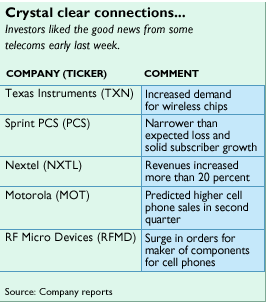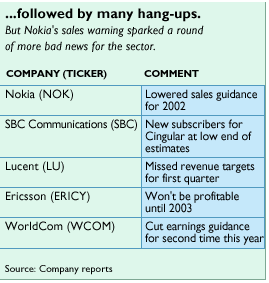
NEW YORK (CNN/Money) -
The telecom sector is like a really bad horror movie. Just when you think that things can't get any worse, they do.
Most recently, there was a triple dose of terror from Lucent, Ericsson and WorldCom. (For more on how telecoms affected the overall market on Monday, click here.)
What makes the bad telecom news even more disheartening is that there were actually some brief glimmers of hope early last week. Corning (GLW: Research, Estimates) pre-announced a narrower-than-expected first quarter loss. And a slew of wireless companies, including Sprint PCS (PCS: Research, Estimates) and Motorola (MOT: Research, Estimates), issued rosy forecasts for the remainder of the year.
But Nokia (NOK: Research, Estimates) lowered its revenue targets for 2002 on Thursday and all subsequent telecom news has been bleak. Nortel Networks (NT: Research, Estimates) gave a poor outlook for the next quarter and SBC Communications (SBC: Research, Estimates) and BellSouth (BLS: Research, Estimates) issued unexciting growth forecasts. Then came WorldCom after the closing bell on Friday, followed by Lucent and Ericsson on Monday.
So can it get any worse for telecom stocks? On the equipment side, Lucent (LU: Research, Estimates) is down nearly 30 percent this year and competitor Nortel has lost half its value. Long distance giant AT&T (T: Research, Estimates) is off about 25 percent while WorldCom (WCOM: Research, Estimates) has plunged more than 70 percent. On the wireless side, Nokia is down more than 30 percent while Sprint PCS has plunged nearly 55 percent.
Boo!
A vicious circle
The pain runs deep down the telecom food chain. Long-distance companies like AT&T, WorldCom and Sprint (FON: Research, Estimates) have been forced to slash their prices in response to competition from regional companies like Verizon (VZ: Research, Estimates) and SBC as well as from wireless companies like Nextel (NXTL: Research, Estimates) and VoiceStream, owned by Deutsche Telekom (DT: Research, Estimates).

But the regional companies -- the Baby Bells -- have also been struggling, in large part due to last year's recession. As a result, all carriers, long distance and regional, have been forced to cut their capital expenditures, that is, spending on new equipment.
The cutbacks have had a trickle-down effect on the companies that make telecom equipment, including Nortel, Lucent and Ericsson (ERICY: Research, Estimates). Although Lucent reported a narrower loss than expected, the company still missed its revenue target for the quarter and said it does not expect to be profitable until fiscal 2003 (ending in September).
And for Ericsson, times are so tough that the company, which said that it will lose money in 2002, is actually asking shareholders to participate in a rights offering in order to raise $2.9 billion to pay down debt. (In a rights offering, also known as a cash call, existing shareholders are given the option to buy more shares at a discount to the market price.)
Not going to get better soon
Unfortunately, it doesn't look like there's much to look forward to this year or next. "I don't really see a recovery in the service providers that would be doing the buying of telecom equipment for quite some time. They need to consolidate and address their pricing structure. They might not be healthy until 2004," says Jaye Morency, manager of the DLB Tech Fund.

What's more, Robb Parlanti, senior portfolio manager for mutual fund group Turner Investment Partners, says that the carriers might be shooting themselves in the foot by not spending. On the one hand, investors want to see improved profitability and one way of doing that is cutting back on capital expenditures. But by foregoing such purchases, the risk is that they won't be competitive because their services won't be top notch.
"Carriers want to show improvement in free cash flow but in the longer-term it might be jeopardizing growth," Parlanti says.
And even though wireless carriers have been a major reason behind the declining prices of long-distance rates, they might not be the best investments just yet either. "We don't own any wireless service providers because we have no idea about pricing. Wireless as a business will be there. The hard part is what do you charge," says Tom Laming, manager of the Buffalo Science and Technology Fund.
Slim pickings
So is there anything worth buying? Certainly stocks have fallen so far that there might be some values, right? Yes, fund manager say, but probably not many.
Laming says the only telecom-related companies he owns right now are Cisco and Nokia. Morency says she recently sold Ericsson and now owns only Cisco, Nokia and Motorola.
Parlanti also likes Cisco. As of March 31, the stock was the largest holding in the Turner Disciplined Large Cap Growth Fund and the tenth largest holding in the Turner Technology Fund.
Dean Kosantas, manager of the Federated Communications Technology Fund, says he owns the three major Baby Bells, Verizon, SBC and BellSouth, as well as Cisco. He sold off his wireless holdings earlier this year, he says.
Why Cisco when most networking companies are doing horribly? All four fund managers pointed to the fact that Cisco is the dominant player in telecom equipment, making things like routers and switches. But unlike Nortel and Lucent, Cisco's customer base is mainly what is known as an enterprise customer. That means that they are businesses that are not telecom carriers.
So since Cisco has less exposure to telecoms, it is not as hurt by the capital spending cutbacks. To be sure, Cisco's results have been affected by the sluggish economy, but not to the same extent that Nortel's and Lucent's have. Plus, Cisco has one thing that Nortel and Lucent lack, a clean balance sheet, with no debt and $7.6 billion in cash.
Cisco's stock is also trading at a reasonable earnings multiple, at 31 times estimates for its next fiscal year, ending in July 2003. Analysts are expecting Cisco's earnings to increase at a 25 percent clip annually over the next three to five years, according to Thomson Financial/First Call.
Consolidation needed but not likely in near-term
What will it take for investors to get excited about the rest of the group? Consolidation could be one catalyst. Kosantas says there are too many wireless carriers and until there are some mergers, none of the wireless companies will be able to establish reasonable pricing structures in place in order to make money. The same can be said for the long-distance companies.
The problem, however, is that the likely buyers -- the Baby Bells-- would probably be slaughtered by Wall Street if they tried to acquire the troubled long-distance companies right now. "None of these guys want to risk their balance sheets with all the focus on that right now. They want to maintain their credit ratings and are not going to go buy someone with a huge debt load," Parlanti says.
| |
 RELATED STORIES
RELATED STORIES
| |
| | |
| | |
|
For this reason, Parlanti says he doesn't expect meaningful consolidation in the sector to take place for another year or two. And even when it happens, he says, there's a good chance that the buyers won't pay big premiums for the companies they purchase. So investors wouldn't make much from a takeover.
All in all, it's not a pretty picture. Forget about the upcoming, and totally unnecessary, installment of the Friday the 13th movies featuring hockey-mask wearing psycho killer Jason. Telecom stocks are truly scary.

|

